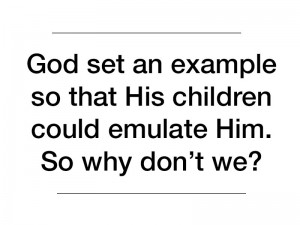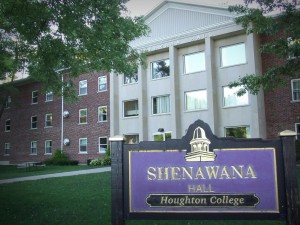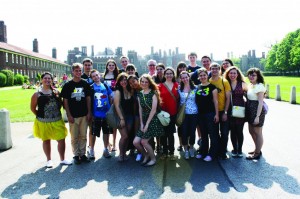Every Sabbath, I ask myself this: to do homework or not to do homework – that is the question. Whether ‘tis nobler in the mind to conquer the papers and projects of outrageous overload, or to relax with my weekly Sabbath away from the tsunami of stress.
 Even here at a Christian college, I notice that many students spend their Sabbaths cramped up in their room, studying for that big exam they have the next day or starting that eight page paper that they have been avoiding like the plague. Where is their Sabbath day of rest in this? What has happened to the day that God has set aside as holy? Exodus 31 tells us, “You must keep the Sabbath day, for it is a holy day for you,” and what joy we feel when we observe the Sabbath!
Even here at a Christian college, I notice that many students spend their Sabbaths cramped up in their room, studying for that big exam they have the next day or starting that eight page paper that they have been avoiding like the plague. Where is their Sabbath day of rest in this? What has happened to the day that God has set aside as holy? Exodus 31 tells us, “You must keep the Sabbath day, for it is a holy day for you,” and what joy we feel when we observe the Sabbath!
The Sabbath was made to meet the needs of people, and not people to meet the requirements of the Sabbath (Mark 2:27). We are human, and because of that, we have limitations. We cannot run continuously without ever getting exhausted; heck, I can barely run a mile without breathing like Darth Vader and getting side stickers. For us humans, rest is a necessity. In 2011, full-time college students studied an average of 15 hours a week, 30% got less than 6 hours a sleep a night, and 25% worked 20 hours or more a week (National Survey). These statistics alone show that college students overwork, under-sleep, and over-commit themselves.
But because God cares for us and loves us, He gives us a model to follow. That model is himself. On the third page of my Bible, I read, “On the seventh day God had finished his work of creation, so he rested from all his work. And God blessed the seventh day and declared it holy, because it was the day when he rested from all his work of creation” (Genesis 2:2-3). Now, I can’t imagine that God was exhausted and that He actually needed an entire day to rest. But God set an example so that His children could emulate Him. So why don’t we? Why do we fill the Sabbath with work, homework, and constant business?
This is something that we as Christians should change. We should weekly take the Sabbath. So what is one to do on the Sabbath? Are they just supposed to lie in bed all day sleeping? Well, there is a difference between being lazy and resting. I believe Barbara Brown Taylor, a priest, professor, and theologian, says it best in her book, An Altar in the World, when she describes the Sabbath as “a day of saying no. A day of spiritual growth. A day of not doing, but being.” I don’t think the question is so much, “If I do this, does that count as working on the Sabbath?” as much as “How can I rest today and enjoy this day that God has blessed me with and has made holy?”
That being said, I’m not going to be like the Pharisees, defining what can and cannot be done on the Sabbath, but know that the Sabbath looks different for each person. Sleep in. Go to Church. Spend time with God: through prayer, worship, his word. Journal. Spend time relaxing, giving your mind a break from all of the studying and paper writing. Fellowship with friends, enjoying their company. Go on a hike. Read a book. Take a nap. The options are endless.
But there is one thing that is important, and that is to “Be still and know that God is God” (Psalm 46:10).
And I admit, it is hard to obey the Sabbath. This past Sunday, I battled with whether to do homework or not. With two papers and readings that were due on Monday alone, taking an entire day off from homework sounded unreasonable. But I tell you what, I kept the Sabbath. I spent time with God, I worshipped, I watched a movie, read a book, hung out with friends, and ended the night celebrating a friend’s birthday. And throughout it all, I had peace. When Monday morning rolled around, God gave me the strength to rise out of bed, and blessed me with an abundant amount of time to work on homework. And I am still at peace, thankful once again, that I obeyed my Father, rested, and took the Sabbath.
I believe Christian author Mark Buchanan sums up the Sabbath the best, saying, “Sabbath imparts the rest of God – physical, mental, spiritual rest, but also the rest of God – the things of God’s nature and presence we miss in our busyness.”
For these very reasons, every Sunday I say to myself: To observe Sabbath or to observe Sabbath. There is no question.



